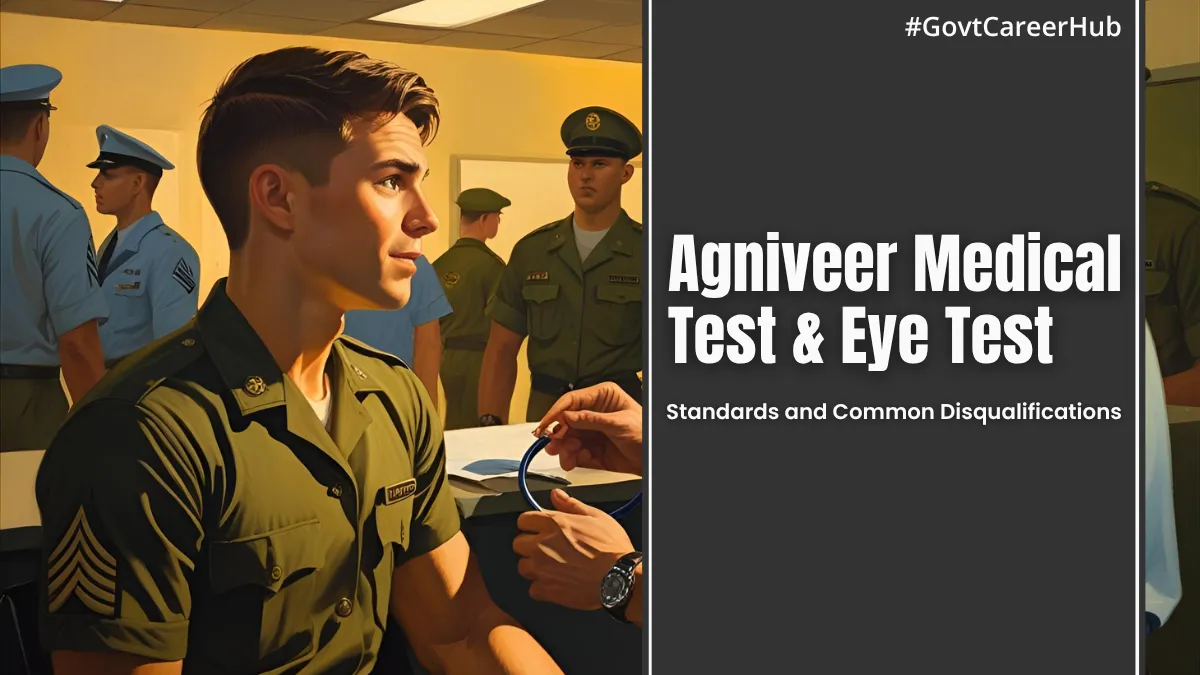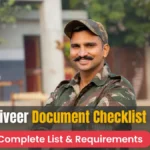Last Updated: July 25, 2025 at 2:17 pm
The Agniveer recruitment scheme has transformed how young Indians join the armed forces, but one aspect that remains unchanged is the stringent medical examination process. Every year, thousands of aspirants clear the written examination and physical fitness tests, only to face disappointment during the medical evaluation. Understanding the Agniveer Medical Standards and common disqualification reasons can help you prepare better and avoid last-minute surprises.
Understanding the Agniveer Medical Examination Process
The medical examination for Agniveer recruitment follows a comprehensive approach designed to ensure that selected candidates can withstand the physical and mental demands of military service. The process typically spans 3-5 days at designated Military Hospital or Command Hospital facilities across the country.
The medical board consists of specialist doctors who evaluate candidates across multiple parameters. Unlike civilian medical check-ups, military medical standards are exceptionally strict because service personnel must be capable of performing duties in challenging environments, from high-altitude regions to desert conditions.
Complete Agniveer Medical Standards
Physical Measurements and Anthropometry
The medical examination begins with basic physical measurements that go beyond simple height and weight checks. Medical officers assess your overall physical development, body proportions, and muscular build. The chest expansion measurement is particularly important, as it indicates respiratory capacity.
Candidates with disproportionate body measurements or signs of malnutrition may face scrutiny. The medical board looks for evidence of physical fitness that aligns with military service requirements.
Cardiovascular System Evaluation
Heart-related conditions are among the leading causes of medical rejection in Agniveer recruitment. The examination includes detailed ECG analysis, blood pressure monitoring, and assessment of heart sounds. Functional or organic disease of the heart or blood vessels, presence of murmurs or clicks on auscultation can lead to disqualification.
Even minor irregularities like innocent heart murmurs can lead to temporary deferment for further evaluation. Candidates with a history of chest pain, palpitations, or family history of cardiac issues should be prepared for additional tests. The medical board maintains zero tolerance for any condition that might compromise performance during physical training or operational duties.
Respiratory System Assessment
Lung function tests form a crucial part of the medical evaluation. The assessment includes chest X-rays, spirometry tests, and clinical examination of breathing patterns. Evidence of diseases of bronchi, lungs or pleurae detected on radiological examination of the chest will disqualify the candidate.
Conditions like asthma, chronic bronchitis, or any history of tuberculosis can result in medical unfitness. Even seemingly minor issues like persistent cough or seasonal allergies that affect breathing can be problematic. The medical board evaluates whether respiratory conditions might worsen under stress or in different climatic conditions.
Neurological and Psychiatric Evaluation
Mental health assessment has gained prominence in recent military medical protocols. The evaluation includes tests for cognitive function, emotional stability, and psychological resilience. Candidates undergo screening for conditions like depression, anxiety disorders, or any history of psychiatric treatment.
Speech disorders, hearing impairments, or balance issues also fall under neurological assessment. The medical board looks for any condition that might affect communication or coordination during military operations.
Eye Test Standards and Vision Requirements
Vision standards represent one of the most critical aspects of Agniveer medical examination. The requirements vary between different branches of the armed forces, with updated standards implemented for the 2024-25 recruitment cycle.
Visual Acuity Standards for Indian Army Agniveer
For Army Agniveer positions, the minimum visual acuity requirement is 6/6 in the better eye and 6/9 in the worse eye without correction. Technical trades may have more stringent requirements, with some demanding 6/6 vision in both eyes.
Candidates who wear spectacles or contact lenses can still qualify, provided their corrected vision meets the required standards. For corrected distant vision, candidates should achieve 6/6 in the better eye and at least 6/9 in the worse eye with maximum residual refraction of +1.5 in any meridian for either myopia or hypermetropia.
Navy and Air Force Agniveer Vision Standards
Navy Agniveer candidates must meet specific vision requirements that include comprehensive internal eye tests performed using an ophthalmoscope to rule out any possible eye disease. Air Force Agniveer candidates face the most stringent vision requirements, with additional tests for depth perception and binocular vision.
Colour Vision Assessment
Both male and female candidates should be able to distinctly recognise shades of red and green during colour vision testing using Ishihara charts and other standardised methods. Complete colour blindness results in automatic disqualification, while partial colour vision defects may limit trade options.
Candidates with colour vision issues might still qualify for certain non-technical roles where colour discrimination is not critical. They should also have good binocular vision as assessed during the comprehensive eye examination.
LASIK and Corrective Surgery Considerations
Candidates who have undergone LASIK or Excimer (PRK) laser procedures for hypermetropia or myopia can be considered for selection, provided they meet specific criteria. The surgery should be uncomplicated and stable, with stable refraction maintained for a minimum duration of 6 months post-surgery.
The axial length should be within permissible limits, and candidates should have a healthy retina with no signs of complications from the corrective procedure. This represents a significant update in military medical standards, acknowledging advances in refractive surgery.
Common Medical Disqualifications
Musculoskeletal Issues
Joint problems, chronic back pain, and limb deformities constitute significant disqualification factors. Even minor issues like flat feet or knock knees can be problematic if they affect mobility or might worsen during rigorous training.
Previous fractures, especially if they involved joints or resulted in reduced range of motion, require detailed evaluation. The medical board assesses whether old injuries might compromise future performance or increase injury risk during service.
Skin Conditions and Allergies
Chronic skin conditions like eczema, psoriasis, or severe acne can lead to medical rejection. The concern centres around how these conditions might worsen in field conditions with limited medical facilities.
Extensive tattoos, especially those that are obscene, religious, or indicate gang affiliation, can also result in disqualification. However, small, discrete tattoos are generally acceptable.
Dental and Oral Health
Poor dental health reflects overall hygiene and can indicate potential future problems. Missing teeth, severe dental caries, or gum disease can result in temporary deferment until treatment is completed.
The military places emphasis on dental health because access to dental care may be limited during field operations, and dental emergencies can affect operational readiness.
Metabolic and Endocrine Disorders
Diabetes, thyroid disorders, and other hormonal imbalances typically result in medical unfitness. These conditions require ongoing medical management that may not be feasible during military operations.
Obesity or being significantly underweight also falls under this category, as both conditions can affect physical performance and increase health risks.
Laboratory Tests and Investigations
The medical examination includes comprehensive blood tests checking for anaemia, blood sugar levels, liver function, kidney function, and infectious diseases. Urine analysis helps detect diabetes, kidney problems, and urinary tract infections.
HIV testing is mandatory, and positive results lead to automatic disqualification. Similarly, hepatitis B and C screening is conducted, with positive cases being carefully evaluated for infectivity and liver function.
Preparing for the Medical Examination
Pre-Medical Health Optimisation
Start preparing for your medical examination at least 3-6 months before the expected date. Focus on maintaining optimal health through regular exercise, balanced nutrition, and adequate sleep. For comprehensive preparation guidance, check our detailed Agniveer preparation strategy.
Address any known health issues proactively. If you wear glasses, ensure your prescription is current and consider getting backup spectacles. Maintain good dental hygiene and complete any pending dental treatments. For more information about Agniveer eligibility criteria, visit our complete guide.
Documentation and Medical History
Prepare a complete medical history including any previous illnesses, surgeries, medications, or family history of genetic conditions. Honesty during medical examination is crucial, as concealing medical history can lead to disqualification later if discovered.
Gather all relevant medical documents, including previous medical reports, X-rays, or specialist consultations. Having comprehensive documentation helps the medical board make informed decisions.
Common Mistakes to Avoid
Many candidates make the mistake of trying to hide medical conditions, thinking they won’t be detected. This approach is counterproductive and can lead to permanent disqualification if deception is discovered.
Avoid taking medications to temporarily improve test results, as this can mask underlying conditions and create dangerous situations during training. Similarly, don’t attempt to memorise eye charts, as medical officers use various testing methods.
What Happens After Medical Examination
Temporary Medical Rejection
Temporary medical rejection doesn’t mean the end of your military career aspirations. Many conditions that cause temporary rejection can be treated, allowing candidates to reappear for medical examination after appropriate treatment and recovery time.
Common reasons for temporary rejection include dental problems, minor surgical conditions, or temporary health issues that can be resolved with proper medical care.
Permanent Medical Unfitness
Permanent medical unfitness is declared for conditions that cannot be treated or might compromise military service. While disappointing, this decision prioritises both individual safety and unit effectiveness.
Candidates declared permanently unfit can explore other career options within defence services that have less stringent medical requirements, such as civilian positions in defence organisations.
Appeal Process
The military medical system provides an appeal mechanism for candidates who believe their medical rejection was unjustified. The appeal process involves review by a higher medical board, though successful appeals are relatively rare. For detailed information about the appeal process, refer to the Defence Medical Services guidelines.
When filing an appeal, provide comprehensive medical evidence supporting your case and ensure all documentation is properly authenticated by recognised medical institutions. For more guidance on handling medical rejections, read our article on Agniveer selection process.
Tips for Success in Medical Examination
Maintain transparency throughout the examination process. Medical officers are experienced professionals who can detect inconsistencies or attempts at deception. Being honest about your medical history demonstrates integrity and helps build trust.
Stay calm and composed during the examination. Anxiety can affect various test results, including blood pressure and heart rate. Practice relaxation techniques and ensure adequate rest before the examination.
Follow all instructions carefully and ask for clarification if you don’t understand something. The medical examination is not designed to trick candidates but to ensure they meet the required health standards for military service.
Future Medical Responsibilities
Understanding that medical fitness is an ongoing requirement helps set appropriate expectations. Military personnel undergo regular medical examinations throughout their service, and maintaining health standards is a continuous responsibility. For information about career progression after Agniveer, check our guide on Agniveer career opportunities.
Developing healthy lifestyle habits during the recruitment process creates a foundation for long-term military service. The medical standards exist not to exclude candidates arbitrarily but to ensure that military personnel can perform their duties effectively while maintaining their health and safety. For the latest updates on defence recruitment, visit the official Ministry of Defence website.
The Agniveer medical examination might seem daunting, but proper preparation and understanding of the requirements significantly improve your chances of success. Remember that these standards exist to protect both individual service members and the effectiveness of our armed forces. Approach the medical examination with confidence, honesty, and thorough preparation, and you’ll be well-positioned to begin your military career successfully.





